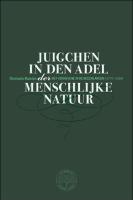Juigchen in den adel der menschelijke natuur. Het verhevene in de Nederlanden (1770-1830)
Author(s)
Christophe, Madelein
Language
Dutch; FlemishAbstract
A storm at sea, hanging cliffs, volcano eruptions at night, threatening thunderclouds over a desolate mountain landscape: all these phenomena incite both fear and pleasure, astonishment and fascination. We call them sublime, after the feeling of the sublime. In the eighteenth century the sublime became the exciting alternative to the beautiful. The concept has ancient roots, but branches out into French, British, German, and Dutch cultures. Stemming originally from rhetoric, in the course of the eighteenth century it became an aesthetic, philosophical and literary concept. In this study the history of the sublime is told for the first time in Dutch. This book focuses on Dutch contributions on the sublime, in the light of the international history of the concept of the sublime. From the earliest translations to the original ideas of Johannes Kinker and Willem Bilderdijk: the Dutch sublime reflects both the entwinement with the European Enlightenment and the specific nature of Dutch culture in the long eighteenth century. Een storm op zee, overhangende kliffen, nachtelijke vulkaanuitbarstingen, dreigende donderwolken boven een woest berglandschap: al deze verschijnselen boezemen tegelijk angst en genot, ontzetting en fascinatie in. We noemen ze subliem, naar het verheven gevoel dat ze oproepen. Het sublieme gold in de achttiende eeuw als het spannende alternatief voor het schone. Het begrip heeft antieke wortels, maar ook Franse, Engelse, Duitse, en Nederlandse vertakkingen. Oorspronkelijk een begrip uit de retorica groeide het in de achttiende eeuw uit tot een esthetisch, filosofisch en literair concept. In deze studie wordt voor het eerst de geschiedenis van het verhevene in het Nederlands verteld. Centraal in dit boek staan een aantal Nederlandse bijdragen over het verhevene, die hier worden gelezen in het kader van de internationale begripsgeschiedenis van het sublieme. Van de vroegste vertalingen tot de eigenzinnige ideeën van Johannes Kinker en Willem Bilderdijk: in het Nederlandse verhevene wordt zowel de verbondenheid met de Europese Verlichting als het bijzondere van de eigen cultuur in de lange achttiende eeuw weerspiegeld.
Keywords
eighteenth century; the sublime; low countriesDOI
10.26530/OAPEN_407366OCN
808385865; 842296357Publisher
Academia PressPublisher website
https://www.academiapress.be/nlPublication date and place
Gent, 2011Classification
Belgium
Literary studies: c 1800 to c 1900
Netherlands
Dutch
Flemish
18th century, c 1700 to c 1799
19th century, c 1800 to c 1899
For adult emergent readers
Literary theory
Literary studies: general


 Download
Download Web Shop
Web Shop